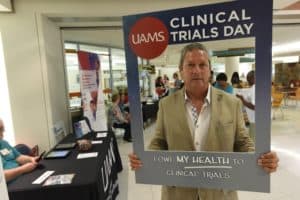In May 2006, Harold “Hap” Peterson was advised to get his affairs in order by UAMS cancer specialist Laura Hutchins, M.D. He had late-stage melanoma, a type of skin cancer, with tumors spreading throughout his body.
He was shocked to hear he had only three to six months to live. “I said, ‘I don’t feel sick at all,’” he recalled while attending the May 21 UAMS Clinical Trials Day celebration.

In addition to radiation treatments, Hutchins, a hematologist oncologist and associate director of clinical research at the UAMS Winthrop P. Rockefeller Cancer Institute, prescribed Dacarbazine, a chemotherapy medication. It worked, but for just two years. There were no other approved medications available to help him. Hutchins suggested a compassionate use clinical trial that was testing an experimental melanoma drug called Ipilimumab.
He jumped at the chance, and it saved his life.
After about five years on the drug, he was cured.
“If I could speak to people who are questioning whether to go on a clinical trial, I would just be thrilled to tell them about my experience,” said Peterson, of Hot Springs Village.
Ipilimumab was approved by the U.S. Food and Drug Administration in 2011.
“There was no cure for this, and I’m sitting here 12 years later,” the retired airline pilot said. “I play golf four times a week, I travel, I do anything I want to do – I feel like a 21-year-old.”
A clinical trial is medical research that requires the participation of people. Clinical trials study such things as new medications, medical devices (such as a knee replacement), and even diets, to find out if they are safe and effective. Many clinical trials test new treatments to learn if they are more effective and/or have less harmful side effects than the standard treatment.

Another clinical trial participant at UAMS Clinical Trials Day, Homer Paul of Conway, recently helped test an experimental Parkinson’s disease drug. Existing drugs have helped Paul manage his disease, and agreed to volunteer to participate in the study testing an extended-release drug. The trial required him to spend 12 hours at a time for multiple blood draws and neurological tests at the UAMS Translational Research Institute.
During one visit, a fire alarm required evacuation of the building. Only two hours into his regimen, the study team walked Paul outside and found a secluded spot nearby to continue his neurological and blood tests until they were allowed back inside.
“They were pretty adamant about getting blood samples exactly on time,” he said. “It was kind of funny because I thought, ‘these nurses are relentless.’ I started calling them the A-Team.”
While Paul has managed his condition with existing drugs over the last 10 years, he said the extended release drug could help even out the highs and lows of today’s medications.
“I’m glad to be a part of it,” he said. “It’s my way to contribute to the cause and to the cure. At the end of the day, you want the quality of life for people to improve.”
Clinical Trials Day is celebrated around the world on or near May 20 each year in memory of the first randomized clinical trial, May 20, 1747, which discovered that citrus fruit could prevent scurvy in sailors.
“Clinical trials not only look at new drugs but also help pave the way toward examining new sensitive methods for determining patients’ response to treatment,” said Faith Davies, M.D., deputy director of the UAMS Myeloma Institute and director of the Phase I Clinical Trials Program for the Cancer Institute and Myeloma Institute. “Bringing new drugs which attack the cancer cells in different ways to our patients is really important and will hopefully improve response and survival rates and decrease side effects.”
“Clinical trials are an important foundation of biomedical research, advancing medicine and saving untold lives with the development of treatments that so many of us take for granted,” said Laura James, M.D., director of the UAMS Translational Research Institute and associate vice chancellor for clinical and translational research. “Clinical Trials Day honors the work of the professionals who develop and conduct clinical trials and all individuals who have previously participated in clinical trials. Their past participation made it possible for current patients to benefit from new innovations to advance health outcomes.”
The Clinical Trials Day celebration was sponsored by UAMS’ Translational Research Institute, Winthrop P. Rockefeller Cancer Institute, Myeloma Institute and Research Compliance Office.
